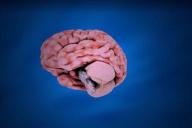human brain
A new study: How memory works – generative AI can help
Have you ever wondered how a complicated mechanism of human memory works? Scientists have – so they've used a special generative AI tool to imitate human memory and research the patterns.
Kate Yakimchuk research memory forming technologies science Psychology 27 January 2024A new discovery: Organiods – a new method to research human brain
The team of scientists has developed a new model of the human brain called organoids. These organoids can generate the major cell types found in the cerebellum, which is important for movement, cognition, and emotion.
Kate Yakimchuk research brain activity science Psychology 18 January 2024A new discovery: Complex sentences are useful – they make your brain work
It always takes more time and effort to process new or unusual information, and it might be pretty beneficial. Specialists have discovered that sentences with unusual grammar or unexpected meaning tend to activate the brain's language processing centers more strongly.
Kate Yakimchuk research brain development information intelligence Psychology 10 January 2024A new discovery: The science behind surprise – how it works
Children are easily surprised, but adults are harder to surprise because of how their brains develop. Recognizing surprises is an important skill, as new things can sometimes be dangerous.
Kate Yakimchuk research brain development science Psychology 10 January 2024A new study: How AI memory works – it's quite similar to human brains
Scientists have found a surprising resemblance between how artificial intelligence (AI) models and the human brain's hippocampus process memory. This discovery provides fresh insights into how AI systems store memories.
Kate Yakimchuk research artificial intelligence memory science Psychology 26 December 2023Surprising baby brains: A new study
Contrary to what we thought, a new experiment shows that baby brains are not significantly less developed compared to other primates. The misconception arises because much of our brain development happens after birth.
Kate Yakimchuk research brain development babies science Psychology 14 December 2023An amazing brain-healing protein: A new study
A recent study helps us understand how the brain reacts to injuries. Scientists found that a protein called Snail is crucial in organizing how brain cells respond after an injury.
Kate Yakimchuk brain damage research protein science Psychology 13 December 2023How little brain evolves: A new study
Humans have developed higher cognitive functions, mainly linked to the expansion of the neocortex. However, researchers now believe that the cerebellum, often called the "little brain," also evolved during evolution, so it adds to unique human abilities.
Kate Yakimchuk research brain development science Psychology 1 December 2023






